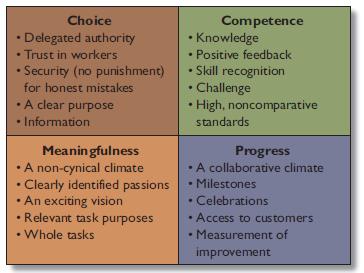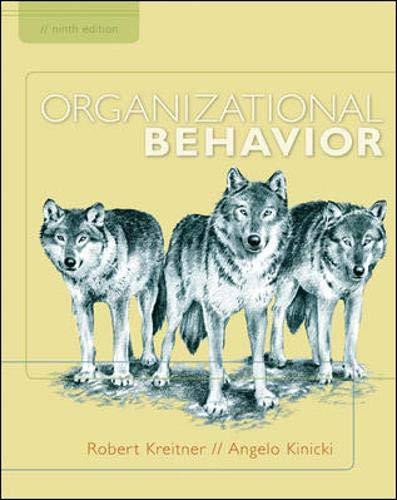At the suburban Philadelphia offices of Kenexa, people grin at one another all day long. Sometimes they
Question:
At the suburban Philadelphia offices of Kenexa, people grin at one another all day long. Sometimes they hug.
Bright posters of the company’s guiding principles dot the walls: YOU’RE ALLOWED TO LAUGH YOUR WAY THROUGH A PROBLEM and MAKING FRIENDS REPLACES OUR ORGANIZATIONAL HIERARCHY. The CEO, Rudy Karsan, spouts odd koanlike talk: “The world is like a roomful of jars. Every time you open a jar, there’s untold treasure in there.”
Ah, but there’s treasure in such psychobabble.
Kenexa is the leading human-resources-services company in America. Sixty percent of the Fortune 100, including Caterpillar, General Motors, Time Warner, and Wachovia, hire Kenexa to help get inside the minds of their employees and build worker loyalty.
It has what analysts say is the sector’s most sophisticated data-crunching software, as well as a squad of scientists—statisticians and industrial and organizational psychologists—to help turn correlations into action plans as well as profit: Kenexa’s revenue has tripled since its 2005 IPO [initial public offering of stock], to $182 million. In HR [human resources], a discipline viewed by workers at most companies as unhelpful at best and horrendous at worst, the company’s secret is its Cyndi Lauper– like conviction that employees just want to have fun.
According to Kenexa, turnover among managers who feel pride in their company is 21% lower than among those who don’t. Adds the Kenyan-born, Canadianeducated Karsan: “When you’re in a job that you enjoy and you’re good at, you’re not just a better worker. You’re a better spouse, a better parent, a better citizen.”
But this isn’t just about group hugs. Kenexa’s scientists do interviews and surveys to learn what inspires employees. (Managers: Apparently, employees love sessions where you just listen to them.) Its industryleading software runs the data through sophisticated algorithms, identifying correlations and possible causations.
Then Kenexa devises strategies to improve work environments and recruit, evaluate, and keep talent.
For example, after studying several service industries, Kenexa recently developed a program in which potential hires use avatars to act out scenarios—from remembering the proper arrangement of items in a hotel room to making judgment calls about inebriated drinkers at a bar—to measure how naturally engaged an applicant would be on the job.
But first, Kenexa has to get itself hired. When Aetna’s HR head for business operations, Craig Hurty, first approached Aetna CEO Ronald Williams about measuring employee motivation, Williams had just one question: How does it change financial performance?
Kenexa’s researchers presented statistics showing that companies with higher satisfaction scores had 700%
higher shareholder return. “When I sent those results to our CEO, I was up in his office that same day, and we spent half an hour going through the results,”
Hurty says.
Karsan notes that knowing employees are passionate is pointless if a company doesn’t know how to exploit the passion. Kenexa’s software helps suggest action plans drawn partly from a 4,000-client database of what has worked in the past for its highest-scoring clients. Last year, the company took on a huge and complex case at Boeing, where it drilled down to departmental groups as small as 30 people and delivered tailored plans directly to the company’s 15,000 managers. “It used to be that we’d take the survey, we’d look at the results, everybody would say, ‘Oh, that’s nice,’ and we’d put it on the shelf where it would gather dust until we did the next one,” says John Messman, Boeing’s employee-relations director. Today, he says, everyone from the CEO down to division managers discusses not just scores, but also strategies to goose engagement.
Karsan says Kenexa “sells its own dog food internally.”
Everything from recognition programs to in-house competitions to the corporate structure is constantly subject to employee feedback, and everything is meant to boost involvement and loyalty.
Kenexa draws a line straight from its employees’ behavior to its success. The company now has offices in 18 countries, including a newly opened 25-acre research campus in India. “It doesn’t matter where in the world you go,” he explains. “Through their work, people find dignity.”
Questions for Discussion
1. What makes a workplace “fun?” What are your personal on-the-job experiences with productivity enhancing fun? Describe them.
2. Why do Kenexa’s leaders have no excuses when it comes to creating a productive performance management program?
3. If you worked as a salesperson for Kenexa, what would be the key talking points in your sales pitch?
4. In terms of Thomas’s four building blocks in Figure 9–3, how would you rate Kenexa’s potential for generating intrinsic motivation? Explain.
Figure 9-3

5. Would you like to work at Kenexa? Why or why not?
Step by Step Answer:






